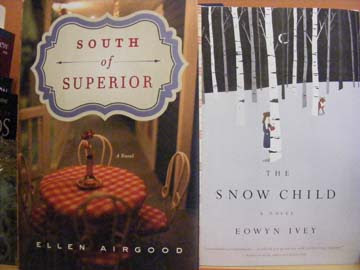 |
| Aripeka Evening |
 |
| Younger Sarah in a Warmer Season |
No, we are not in Florida, but we were looking at old photos of winters
past one recent Sunday morning, and the one seemed worth sharing again. We also
looked at some cute old pictures of Sarah, and I took David on a virtual tour
of my trip to Arizona last spring.
January
seems to be a time for looking back, but for the present, please note winter
hours at top right. New book orders will be taken through Saturdays of each
week, with orders going on the following Monday in order to arrive by the end
of that week.
Now,
a few other timely topics in brief.
January
Special at Bookstore
“This” is a special offer at Dog Ears Books, good for as long as
supplies last. Buy our $9 book bag (the beautiful canvas one featured in the
right-hand column) along with a $15 calendar (Leelanau Township scenes by Karen
Casebeer, also over there on the right), and the price for the two items
together, a $24 value,will be a bargain $20 + tax. Your calendar and bag will remind
you on a daily basis of your local community and what every person means to its
success, and you’ll feel good every time you use the bag and don’t have to take
paper or plastic. I’ll have a different special in the month of
February, so stay tuned. Because --
It's Winter—and
(Almost) Everyone Wants Money
“That”
is money, so if you don’t want to read this section, scroll down to the next.
People
who don’t write letters don’t enjoy picking up mail, either, I’ve noticed. For
them, an empty mailbox is good news: “No bills!” Having grown up in a letter-writing
family, my heart is always light with hope as I turn the key to see what waits
within, and often there is something delightful. Letters and cards and
postcards from friends, along with seed catalogs, are always welcome, as are,
my readers will recall, the little typed notes from that anonymous mystery
poet, “H.” One Saturday morning I received a beautiful New Year’s card from one
of my favorite publishers, who addressed me on the envelope as “The Excellent
and Incomparable” and who included a handwritten personal note inside. That
made my day! The next week there was a handwritten letter from a friend, and
she had enclosed a tea bag, too, since we couldn’t be sitting down at a table
together. My heart was warmed!
But
most of what has filled the box lately has been mail from businesses and
organizations looking for money. Everyone, it seems, has a hand outstretched. I
don’t take the importuning personally. It can’t be personal, because if
they knew my life at all they’d realize they’re barking up the wrong tree when
looking to me for money in January.
Of
course, it isn’t the “wrong tree” when it comes to bills. Bills must be paid.
Phone bills, electric bills, sewer bills, tax bills, bookstore bills, credit
card bills, propane bills, etcetera, etcetera. There are no medical bills in
the mail because everyone from hospital to dentist now demands payment at time
of service or beforehand, and there are no cable or “dish” bills because we
opted out of television years ago, but there are still plenty of bills. More
than enough.
What
I call the “wrong tree” mail is that asking either for charitable donations or
subscriptions or looking to me as a new customer for whatever product or
service someone is trying to sell. Thank you, I made my December donations, and
that’s all I can do for now, both because of the aforementioned pesky bills and
because in our household we can’t seem to break the habit of regular meals.
During most of the year, I make charitable donations in the form of memorials,
as occasions arise.
I’ve
renewed my subscription to Book Source Magazine and am a new
subscriber to the London Review of Books, because they offered me a fabulous
deal. New York Review of Books subscription has run out, but a friend and I
will exchange London and New York, so we’ll both have the benefit of both. As
for making a decision about health insurance based on advertising that comes in
the mail, how foolish would I have to be? And people who want to sell me
advertising or offer themselves as paid consultants to my business—sorry! Wrong
tree!
A Couple
Backward Glances at the Blog
As
we sink into winter, a couple of my old posts bobbed up. They don’t appear on
the all-time greatest hits of Books in Northport, but they’re things I enjoyed
putting together, and a few readers either discovered or revisited them last
week. The first addresses the question of the relation of “blogging” to
“writing,” and that post engendered a pretty lively conversation when it first
appeared. The other, on fiction, essays, criticism, etc., was in itself almost
a review of a couple of books that gave me plenty of food for thought.
Where
We’re Going, Will We Need Roads?
Ah,
yes, you guessed it: I’m not thinking about roads but about the ever-uncertain
future of printed books and actual, physical, “bricks-&-mortar” bookstores.
Here’s a recent contribution to thoughts about it all. The writer says there is evidence that
the disappearance of bookstores lowers the market demand even for e-books and
means that fewer books will be read in any form. Once again, my mantra: I’m
here now, I’m here now, I’m here now.... And isn’t “now” all we ever truly have?
 |
| January 2013: Sarah at edge of woods |











